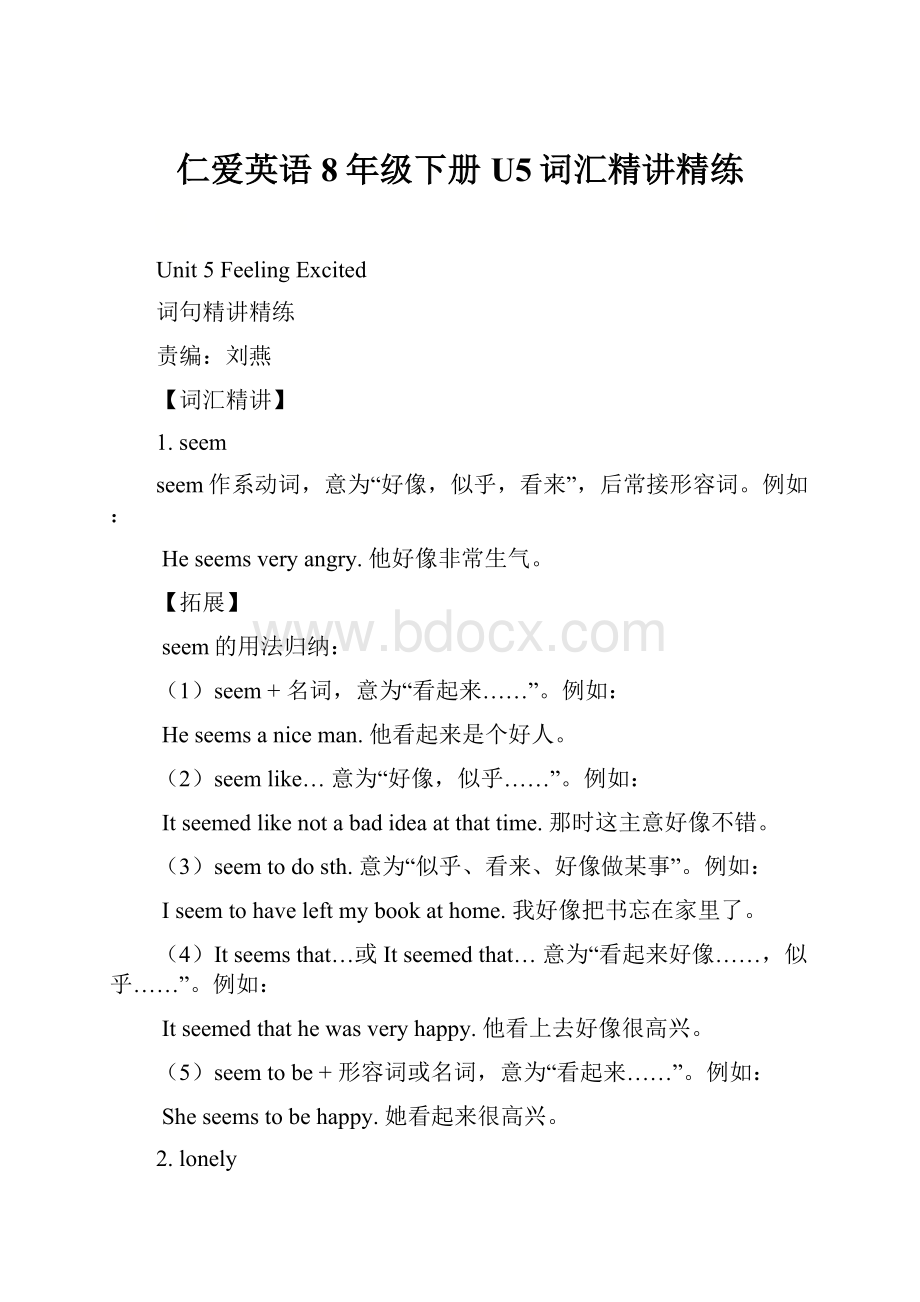 仁爱英语8年级下册U5词汇精讲精练文档格式.docx
仁爱英语8年级下册U5词汇精讲精练文档格式.docx
- 文档编号:22134048
- 上传时间:2023-02-02
- 格式:DOCX
- 页数:21
- 大小:122.71KB
仁爱英语8年级下册U5词汇精讲精练文档格式.docx
《仁爱英语8年级下册U5词汇精讲精练文档格式.docx》由会员分享,可在线阅读,更多相关《仁爱英语8年级下册U5词汇精讲精练文档格式.docx(21页珍藏版)》请在冰豆网上搜索。

Don’tleavemealone.Iwillfeellonely.
别留下我一个人,我会觉得孤单的。
3.lively
lively作形容词,意为“充满活力的,活泼的,有生气的”,常用作定语或表语。
Shewasalivelyyoungwomanwithpatienceandimagination.
她是个充满活力的年轻女性,富有忍耐力和想象力。
Hehadastrangewayofmakinghisclasseslivelyandinteresting.
他有一种奇妙的方法,使他的课堂生动有趣。
辨析:
lively,alive,live与living
这四个词都可用作形容词,异同点如下:
(1)lively常用作定语或表语,“充满活力的,活泼的,有生气的”。
Shehadasweet,livelypersonality.
她的性格可爱活泼。
(2)alive常作表语或后置定语,“有生命的,活的”。
Hewasalivewhentheytookhimtothehospital.
人们把他送到医院时他还活着。
(3)live作定语,“活的,有生命的(主要用来指鸟或其他动物);
现场的,直播的”。
Look!
Thereisalivefishinthepool.
看!
池子里有一条活鱼。
Wewatchedalivetelevisionshow.
我们观看了一场电视现场直播的表演。
(4)living意为“活的,健在的”。
Hisgrandpaisstilllivingattheageof96.
他爷爷96岁了,仍然健在。
4.either
(1)either作副词,意为“也不”,用在否定句中。
Hecan’tplaytheviolin.Ican’t,either.
他不会拉小提琴,我也不会。
【拓展】either;
too和also的辨析:
1)either表示“也不”,用在否定和疑问句句末,常用逗号隔开。
Idon’tlikethefood,hedoesn’t,either.
我不喜欢这种食物,他也不喜欢。
2)too表示“也”,用在肯定句末,常用逗号隔开。
Hehasalotofpenpals,too.
他也有很多笔友。
3)also表示“也”,用在肯定句中间,位于be动词、助动词或情态动词后,行为动词前。
Wealsolikeplayingfootball.
我们也喜欢踢足球。
【注意】区别这三个词,关键取决于该词在句中的位置和肯定句、否定句的判断。
(2)either作代词,表示“(两者中)任意一个”。
Therearemanytreesoneithersideofthestreet.
在街道的每一边都有很多树。
(3)either…or…为连词短语,连接两个相同的句子成分,意为“要么……要么……;
或者……或者……;
不是……就是……”。
Heeitherstaysathomeorvisitsfriendsontheweekend.
在周末,他要么待在家里,要么拜访朋友。
Theywillcomeeithertomorroworthedayaftertomorrow.
他们不是明天来,就是后天来。
【注意】either…or…连接两个主语时,谓语动词的形式与紧靠谓语的那个主语的形式保持一致,即遵循就近原则。
EitherIorheisondutytoday.
今天不是我值日,就是他值日。
5.dealwith
(1)dealwith意为“处理,解决”,with为介词,其后常接trouble,problem等词。
Iamgoodatdealingwithpressure.
我善于应付压力。
(2)dealwith还可意为“与……打交道,与……做买卖”,此时,主语通常是表示人、公司、商店等的名词。
Theyhavelearnedtodealwithvariouspersons.
他们学会了和各种人打交道。
dealwith与dowith二者都有“处理,对付”之意。
(1)dealwith侧重“方式、方法”,常与how连用。
HowareyougoingtodealwiththeTVset?
你打算怎么处理这台电视机?
(2)dowith侧重“对象”,往往与what搭配使用。
Whatareyougoingtodowiththecamerayoufound?
你打算怎么处理你找到的那部照相机?
6.elder
elder为形容词old的比较级形式,意为“年长的”。
同时old还对应有一个比较级形式older,注意二者之间的区别。
【注意】
older,elder的区别:
(1)older通常用于比较两个人的年龄大小或者两个物体之间的新旧程度。
Heisolderthanhisbrother.他比他的兄弟年长。
Thisbookisolderthanthatone.这本书比那一本旧一些。
(2)elder专用于同一个家庭成员之间的长幼对比,也有时指职位、身份较高的人,且只能用于形容人。
Tomismyelderbrother.汤姆是我的哥哥。
Youareallelderstatesmen.你们都是政治元老/资深政客。
7.though
(1)though可以作连词,意为“虽然;
即使;
纵然”,放在从句的开头和中间均可。
Thoughitwasraining,wewerestillworking.
虽然下着雨,但我们仍然坚持工作。
(2)though还可以作副词,意为“然而;
但是”,一般放在句末。
Itwasimpossibleforhimtodosomuchhomework.Hefinisheditthough.
他不可能完成这么多作业,然而他做完了。
(1)though和although的辨析:
1)两者都可用作连词,意义相同,但although常放在从句开头的位置,不用于从句中间;
而though放在从句的开头和中间均可。
Althoughtheyarepoor,theyarehappy.
=Thoughtheyarepoor,theyarehappy.=Poorthoughtheyare,theyarehappy.
虽然他们很穷,但很快乐。
2)although只能作连词,但though既可以作连词,也可以作副词。
(2)常用搭配:
asthough好像eventhough即使
【注意】although和though不能和but连用,二者只能用其一。
8.sick
sick是形容词,意为“病的;
恶心的;
厌倦的”。
Hermotherwassick. 她妈妈病了。
【拓展】sick和ill的辨析:
sick和ill都意为“生病的”,但用法不同:
ill作“生病的”讲时,只能作表语;
sick意为“生病的,恶心的”时,既可作定语,又可作表语。
Theboydoesn’tliketoeatanything.Hemaybeill.
这个男孩不愿意吃东西,他可能病了。
Lucy’smotherissick/illinhospital.
Lucy的妈妈生病住院了。
She’llvisithersickmotherafterschool.
放学后她要去看望生病的妈妈。
9.proud
(1)proud是形容词,意为“自豪的,骄傲的”。
常用结构:
beproudofsth.意为“以……而骄傲”。
IamveryproudofbeingaChinese.
作为一名中国人我很自豪。
(2)beproudtodosth意为“为做某事而骄傲”。
Weareproudtobealeaguemember.
我们为成为团员而骄傲。
(1)pride是名词,意为“骄傲,自豪”。
Heistheprideofourcity.他是我们城市的骄傲。
(2)常用的结构:
takeprideinsth.意为“为某事骄傲”。
Theytakegreatprideintheirdaughterwhoisnowafamousscientist.
他们为女儿成为著名的科学家而感到自豪。
10.ready
(1)ready作形容词,意为“准备好的”。
Iseverythingready?
一切都准备好了吗?
Areyouready?
你准备好了吗?
(2)bereadyfor意为“准备去……”,后接名词或动名词,同义短语为getreadyfor。
I’mreadyforbed.我正准备睡觉。
Thechickenwillsoonbereadyforthepot.
这些鸡肉很快就可以准备下锅了。
be/getreadyto+动词原形,意为“准备做……”。
I’mgettingreadytotravel.我正准备去旅行。
11.fill
fill表示“装满,填满”,可用作及物和不及物动词,通常与介词with连用。
Everything
is
filled
with
new
life.
万物充满了生气。
Hefilledtheglasswithwater.他把杯子装满了水。
(1)full
作为形容词,意为“充满的,全部的”。
Please
tell
me
the
full
story.
请将全部情况告诉我。
The
train
was
traveling
at
speed.
火车正全速前进。
(2)befullof
意为“充满……的”。
Theroomisfullofyoungpeople.
房间里全是年轻人。
12.loud
loud作形容词,意为“高声的,喧哗的”。
作副词,表示“喧哗地,高声地”,常用于talk,speak,laugh等动词之后,强调声音响亮。
比较级为louder,最高级为loudest。
Hisvoiceisveryloud.他的声音很大。
Hespeaksloudandclear.他说话响亮清楚。
(1)aloud是副词,意为“出声地,高声地”,常与read,call等动词连用,强调发出的声音不是很大但能听见。
Canyoureadaloud?
你能读出声来吗?
(2)loudly是副词,意为“高声地,喧哗地”,可以与loud互换,但含有喧闹的意思,强调声音高,不悦耳。
Someoneknockedloudlyatthedoor.有人大声敲门。
【词汇精练】
I.根据句意及首字母提示补全单词。
1.Ourteacherstaughtustosingl____songsbeforeclass.
2.Atfirst,themotherawentmadbecauseshelostherdaughter.
3.Mr.Smiths_____tobepleasedwiththenewstudentcalledJohn.
4.Myteacherwillbemore
s
withmefromnowon.
5.Istudyhard,sothatImaynot
f
intheexaminations.
6.E
youacceptdecisionsoryougetout.
7.His
touchedustotheheart.
8.Hewas
p
tobeelectedchairmanoftheStudents’Union.
9.Please
inthearrivalcard.
10.Don’targuewithme,my
d
isfinal.
II.根据句意及汉语提示填空。
1.(最后),
Japaneseagreedtochange
machine.
2.(振作点),man.Thingsarenotasbadasyouthink.
3.(顺便问一下),haveyoubeentoBeijing?
4.Shehadbreadandeggforbreakfast(像往常一样).
5.Shemust
(为……骄傲,自豪)herself.
6.SincePeter____________(不严格要求)himself,intheendhelostthegame.
7.It’shardto
____________(做决定)withoutknowingallthefacts.
8.____________(别着急).You’llbeOK.
9.Sheis________(处理)herfather’sbusinessverywell.
10.I’llhelpyou,________(即使)Idon’tsleepforanight.
III.根据句意,
用括号内所给词的适当形式填空。
1.Maryhappenedtomeetoneofheroldfriendsandinvitedhim____(go)tohernewhouse.
2.Althoughthemealwascold,ittasted_____(well).
3.Youwillfeelhappywhensomeone____(smile)atyouinastrangeplace.
4.Shewas
____(worry)abouthermissingson.
5.Henryismy
____(old)
brother;
heistwoyearsolderthanI.
6.Hehasgivenmea
____(help)
suggestion.
7.Itisfarbettertoread
____(loud)
thantoreadinsilence.
8.“Howareyou
____(feel)
now,sir?
”heasked.
9.Marysaidwithgreat
____(sad).“Iknow.It’shopeless.”
10.I
take
____(proud)
in
whatIlearn.Ifinditveryinteresting.
IV.填写单词补全对话,每空一词。
Mother:
Getup,Xiaoping.It’stimetogetup.Whyareyoustillin1?
Youshouldgetupand
2forschool.Ifyoudon’thurryup,you’llbelate.
Xiaoping:
I’mnot3well.
Oh,dear!
What’swrong4you?
Idon’tknow.Ihaveaheadache.
Oh,yourheadfeelssohot.Youmusthavea5.Howlonghaveyoubeenlikethis?
Aboutfivehours.
Really?
Ithinkyoushouldgotothehospitalatonce.
ButIamafraidof6thedoctorandIhateto7bittermedicine.
Bebrave,dear!
Followthedoctor’s8.Youwill910soon.
OK,mom.Let’sgotothehospital.
1.______2.______3.______4.______5.______
6.______7.______8.______9.______10.______
V.听力链接。
(2019年兰州中考)
听句子,选择与所听内容相符的图片。
每个句子读两遍。
A.
B.
C.
D.
E.
1._______2.________3.________4.________5.________
【参考答案】
I.根据汉语提示完成下列句子。
1.lively2.almost3.seemed/seems4.strict5.fail
6.Either7.speech8.proud9.fill
10.decision
1.In
end
2.Cheer
up
3.By
way
4.asusual
5.be
proud
of
6.wasn’tstrictwith
7.make
a
decision
8.Takeiteasy
9.dealingwith
10.eventhough/if
1.togo
2.good
3.smiles
4.worried
5.
elder
6.helpful7.aloud8.feeling9.sadness10.pride
1.bed2.prepare3.feeling4.with5.fever/temperature
6.seeing7.take8.advice/suggestions9.get10.well
1-5CDABE
听力材料:
第一节听句子,选择与所听内容相符的图片。
1.Itwasrainylastnight.
2.Lookatthebabymonkeys.They’reverycute.
3.Thereissomethingwrongwithhisheart.
4.Mycousinlikesplayingthepiano.
5.Thegirlcrossedherarms,soitseemedthatshewasn’tinterestedintheconversation.
综合能力演练
责编:
刘燕
I.单项选择
1.—Howmuchdidyou____buyingthenewbike?
—ThreehundredYuan.
A.pay
B.cost
C.take
D.spend
2.—Mikefeltsadbecausehefailedhisexamyesterday.
—I’m
- 配套讲稿:
如PPT文件的首页显示word图标,表示该PPT已包含配套word讲稿。双击word图标可打开word文档。
- 特殊限制:
部分文档作品中含有的国旗、国徽等图片,仅作为作品整体效果示例展示,禁止商用。设计者仅对作品中独创性部分享有著作权。
- 关 键 词:
- 仁爱 英语 年级 下册 U5 词汇 精练
 冰豆网所有资源均是用户自行上传分享,仅供网友学习交流,未经上传用户书面授权,请勿作他用。
冰豆网所有资源均是用户自行上传分享,仅供网友学习交流,未经上传用户书面授权,请勿作他用。


 《Java程序设计》考试大纲及样题试行.docx
《Java程序设计》考试大纲及样题试行.docx
